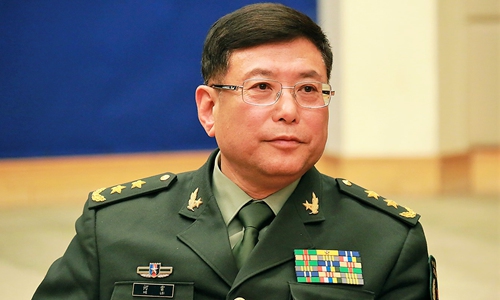Institutional advantage helps China fight COVID-19
By He Lei Source:Global Times Published: 2020/5/18 19:14:55

Lieutenant General He Lei. Photo: Xinhua
"Man must have some spirit," said the late Chinese leader Mao Zedong. A country, a nation, a political party and an army should "have some spirit" as well. Chinese civilization has thrived for 5,000 years, and this relies on China's national spirit, with patriotism at its core, which is also characterized by unity, peace-loving and bravery.
In modern times, especially since the founding of the Communist Party of China (CPC) in 1921, China's national spirit has been carried forward with the combination of revolutionary and scientific elements.
At the beginning of this year, the COVID-19 epidemic erupted with ferocity in China. It is arguably the most dangerous public health emergency the country has ever faced since the founding of the People's Republic of China (PRC) in 1949.
Under the strong leadership of the CPC Central Committee with Comrade Xi Jinping at its core, Chinese people have followed the guidelines for China's epidemic control efforts, namely "confidence, unity, science-based approach and targeted response." China has brought the outbreak under control through arduous efforts.
The institutional advantage of the socialism with Chinese characteristics is reflected in the CPC's centralized and unified leadership. This is also the core of China's anti-epidemic spirit. China's entire COVID-19 fight has been scientifically and strongly promoted under the centralized leadership of the CPC Central Committee and Xi. As core leader of CPC and chairman of the Central Military Commission, Xi has made a series of decisive decisions in the COVID-19 fight, including imposing a lockdown in Wuhan and other cities in Central China's Hubei Province. Xi visited Wuhan, the frontline of the COVID-19 fight in China, in March. He also paid visits to Zhejiang, Shaanxi and Shanxi provinces to guide the battle. He has encouraged the Chinese people to coordinate epidemic prevention and control, the resumption of work, and poverty alleviation.
China's institutional advantage is also reflected in the Chinese people's help for each other, and in the country's ability to pool resources to accomplish large undertakings. In just a short period of time, China deployed more than 340 medical teams and more than 42,000 medical personnel nationwide to provide emergency assistance to Hubei. In a mere 10 days, makeshift hospitals including Huoshenshan Hospital and the Leishenshan Hospital were set up. China also adopted a "counterpart assistance" strategy, pairing 19 donor provinces with counterpart cities affected by COVID-19 in Hubei. The method has efficiently pooled medical equipment, personnel and materials from all over the country to be sent to areas hit hard by the epidemic.
China's commitment to its people-centered philosophy and people's war is another institutional advantage of the Chinese system.
The CPC Central Committee and Xi have always adhered to caring for the people, serving the people, and relying on the people. Since the start of the COVID-19 fight, Xi has stressed that "life is of paramount importance." Protecting people's interests is the basis and starting point of the major decisions that the Chinese government has made. China has adhered to the principle of "early detection, reporting, isolation and treatment," of the infected with dedicated facilities manned by medical professionals with all necessary resources. All suspected and confirmed patients should be admitted to the hospital, and all confirmed patients should be treated. In this respect, China has tried its best to minimize the number of deaths.
Another institutional advantage of the Chinese system is China's promotion to build a community with a shared future for mankind. The virus is a common enemy for all humans. The COVID-19 pandemic is a threat for the whole world, and prevention and control of it is a shared responsibility for all countries and regions. The novel coronavirus does not recognize borders, ethnicity or wealth. No one can detach himself or herself from the crisis. Only by comprehensively strengthening international cooperation can the world win the battle against this deadly infectious disease. So far, China has provided medical materials as well as financial and technological supports to more than 150 countries and international organizations in their fight against the ongoing pandemic, dispatched 21 teams of medical experts to 19 countries. The Chinese military has offered materials and expertise assistance within its capability to the militaries of Iran, Pakistan, Myanmar and other countries.
For the moment, China has not yet eliminated the virus. It still faces increasing pressure from a growing number of imported cases. There are also risks of COVID-19 rebounding. The epidemic situation in some other countries is still severe and even deteriorating. This poses quite a challenge to China. Yet China must continue to carry on its epidemic-fighting spirit. It must valiantly charge in headlong against COVID-19 until the country secures a decisive victory and plays a noble global role on the anti-pandemic battleground.
The author is a deputy of the 13th National People's Congress and former vice president of the Academy of Military Sciences, People's Liberation Army. opinion@globaltimes.com.cn
Posted in: VIEWPOINT